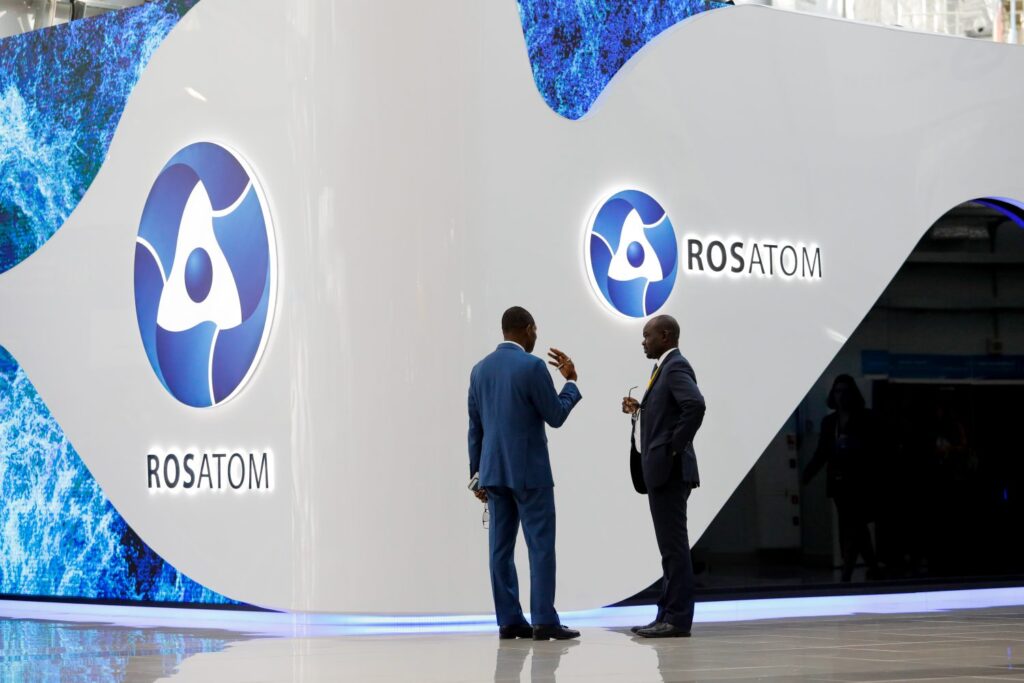Russia’s pledges of economic investment in the African continent are falling well short of expectations, according to the latest data analysis.
Vladimir Putin grabbed headlines at the first Russia-Africa summit in 2019, signing 92 economic agreements and declaring that trade with Africa would double within five years. But Russia fell well short of his target.
In 2024, trade between African countries and Russia totaled $24.5 billion, which paled in comparison to Africa’s $355 billion in trade with its leading partner, the European Union. Of Russia’s total trade with Africa, Russian exports accounted for a lopsided $21.2 billion. Most of that went to three countries: Algeria, Egypt and South Africa.
With an economy based largely on petroleum, mining and arms dealing, Russia has found it easier to project power with propaganda rather than investment or bilateral trade.
Louise Margolin, deputy editor-in-chief of Jeune Afrique’s Africa Business+ news service, said Russia’s failures in its yearslong war on Ukraine have had a profound impact on an already struggling economy. International sanctions have scuttled Moscow’s plans to expand its extractive industries in Africa, thus necessitating a propaganda campaign aimed at the continent to cast the illusion of economic power and success.
“Russia and its firms cannot always fund the projects they announce,” she wrote in an October 16 article for The Africa Report. “Much of its economic presence is for show. It negotiates and signs deals to project the image of a major economic power that can export its know-how. The goal, above all, is geopolitical stature.”
When Russia sought to undermine the sanctions, it turned to Africa to find new consumers for food products, energy and arms. Ebenezer Obadare, a senior fellow at the Council on Foreign Relations, said Russia needs Africa but sees it more as a market than a partner.
“Russia is a political giant without economic capacity,” he told The Africa Report. “It promises a lot, but what can it actually deliver?”
Researchers William Decourt and Spenser Warren said the Kremlin has expanded its engagement in recent years by increasing diplomatic visits, waging false information campaigns across 16 African countries and signing military cooperation agreements in 19 countries since 2014.
Russia’s focus on security over development and reliance on false information campaigns to curry popular support “caters to illiberal leaders interested in fortifying their political security,” they wrote in a June blog for the Institute on Global Conflict and Cooperation. “Africa’s worsening debt crisis and economic hardship also provide Russia with opportunities to increase its financial engagement and gain support from African governments and publics.”
Beverly Ochieng, an analyst at Control Risks consulting company, says Russia is projecting economic power based on hopes and promises that have yet to produce any meaningful prosperity.
“A lot of it is still banked on soft power and a lot of it is banked on geopolitical grandstanding rather than actual effectual changes to the economy or significant input to the economy,” she said in a June interview with Deutsche Welle.
Russia has signed memorandums of understanding (MOU), or nonbinding agreements that typically precede contracts, she said, “but we haven’t seen those MOUs being implemented whether it’s in energy in the Sahel, whether it’s in mining in the CAR [Central African Republic].”
Despite offering scant economic benefits, Russian proxies such as Belarus also are part of the Kremlin’s propaganda campaign, according to exiled Belarusian journalist Hanna Liubakova, a nonresident senior fellow at the Atlantic Council think tank.
In 2023, President Alexander Lukashenko looked to forge ties by visiting Equatorial Guinea and Kenya. In Zimbabwe, he offered tractors and equipment while Belarusian elites established a presence in the country’s gold and lithium sectors.
“These trips have produced little beyond vague memoranda and photo ops,” she wrote in a November 13 report. “These are not signs of diversification, but transactions rooted in authoritarian clientelism.”
Ultimately, analysts warn, the risk of any economic deal with Russia or its proxies is in how quickly and easily it can become one-sided, turning African countries into passive recipients of Russian goods and services rather than co-creators of value.
“There’s a fine line between strategic partnership and supplier-client dependency,” Zimbabwe-based political analyst Donald Porusingazi told the African Press Agency for a July article. “The key will be whether these deals include technology transfer, local manufacturing and long-term capacity building.”
Ochieng believes that is why the Kremlin launched one of its propaganda campaigns in Africa — to perpetrate the myth that it is an economic powerhouse.
“Disinformation that is being propagated by Russian trolls ends up being the dominant narrative, particularly among urban youths,” she said. “In the end, disinformation seems to be filling the gap where we would be getting credible news accounts from mainstream sources.”

